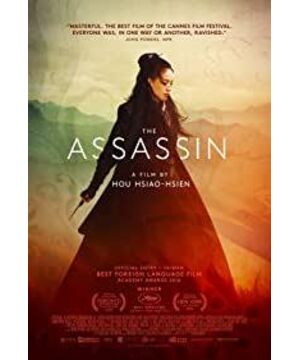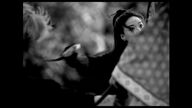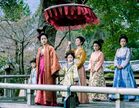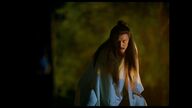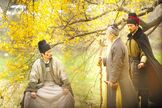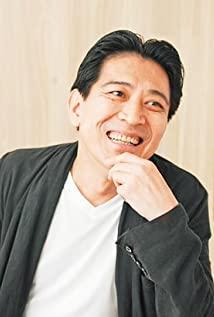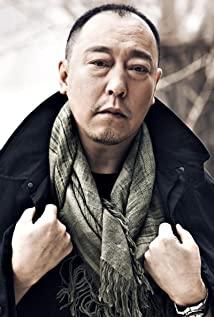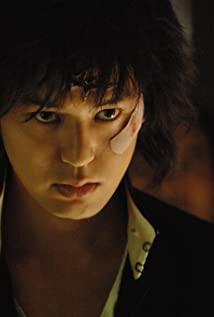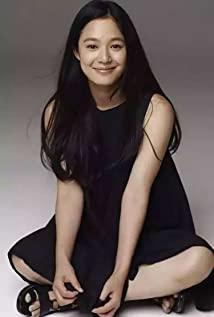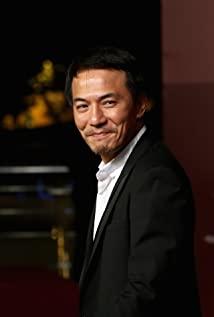and revised) The number of films going to Cannes is obviously different. Hou Xiaoxian’s "Nie Yinniang" has not appeared in the news of the main creator up to now, but it has successively exposed the story outline, shooting notes, 2 minute fragment. Let's start with the most intuitive movie clips. The clip shows how Nie Yinniang sneaked into Tian Mansion, rescued Tian Ji'an's concubine Hu Ji, and met Tian Ji'an face-to-face. The highlight of this story is the "Paper Man" section-Hu Ji was killed by the "Paper Man", and Yin Niang killed the paper man. The paper man in the picture is more like a humanoid smoke. When Yinniang slayed, she loomed out of it, full of oriental magical colors, and the action design was very simple. There were only a few tricks in the confrontation, and the sense of cold weapon was full.
From the shooting notes written by the screenwriter Xie Haimeng, we can roughly see where Hou Xiaoxian’s seven years have been spent: Compared with the legendary version of the Tang Dynasty, the film "Nie Yinniang" has to recreate a character, and Hou Xiaoxian’s habit is to construct a character based on this. The grand background (even if it is not shown in the movie) makes its image convincing enough, the so-called "iceberg theory". From the perspective of Hou Xiaoxian’s handling of the scene of "Bronze Mirror and Life Experience" between his wife, Mu Cong and Hsu Chi, it seems that he did not intend to type "Nie Yinniang". I don’t like deliberate arrangement, design, hands that intervene in, and even close-up shots.
In terms of Hou Xiaoxian's consistent style, it is hard to imagine that he will hand over a "good-looking" martial arts film with ups and downs, hearty emotions, and dazzling action scenes. Then what will he make of "Nie Yinniang"?
1. What has changed in "Nie Yinniang": From the legend of the Tang Dynasty to the movie script
Xie Haimeng said in his shooting notes, "(Nie Yinniang) has been transformed into a brand new story." This is true. The legend of Tang, which is only a thousand words, cannot afford a two-hour movie if it is not rewritten. But is this "rewriting" limited to the storyline? What happened to the movie version of "Nie Yinniang"?
1 Nie Yinniang in the movie
The film outline of "Nie Yinniang" tells the story of "a female assassin with martial arts skills, but in the end was unable to kill." Simply scan the entire storyline: Nie Yinniang (played by Shu Qi) is the daughter of Nie Feng, a general in Wei Bofan town. She was taken away by an aunt at the age of 10 and trained to become a martial arts assassin. She will return home after 13 years. The life is about to take the life of his childhood cousin, the lord of Wei Bo Tian Ji'an (played by Zhang Zhen). At the time of the Anshi Rebellion, the towns were divided and the people were not living, Master Nie Yinniang taught him to "kill a lone husband and thieves to save thousands of people", and his mother Nie Tian told Nie Yinniang that killing Tian Ji'an would make his wife Yuan clan take advantage of the vacancy. In, Wei Bo will cause chaos in the world, for the sake of justice, Tian Ji'an can't kill. At the same time, Nie Yinniang's father, Nie Feng, was ordered by Tian Ji'an to escort Wei Bo's nominally demoted general, Tian Xing, to take refuge elsewhere, and Lu Yu came after the assassination team of the Yuan clan. Nie Yinniang followed behind, met the teenager and the old man picking medicine, and rescued Nie Feng and Tian Xing together. In addition to hunting and killing the important officials of Wei Bo, the Yuan clan also quietly cleared out the Tian Ji'an mansion. Tian Ji'an's concubine Hu Ji's life was almost taken by the paper man's Yin technique. Fortunately, a Yinniang saved her life. So far, Nie Yinniang completely gave up the plan to assassinate Tian Ji'an and closed the case with Taoist aunt. The Taoist aunt regretted that she could not break the relationship, and finally fought and died under Nie Yinniang's dagger. After everything was over, Nie Yinniang, the teenager with a mirror-bearing mirror, and the old man picking medicine floated away.
In addition to the main story line above, the film also confessed a number of important characters to form auxiliary clues to the narrative. For example, the Taoist aunt who took away the young Nie Yinniang is actually the twin sister of Princess Jiacheng, the twin sister of Tian Ji'an's adoptive mother, Princess Jiacheng. When Tian Ji'an's father Tian Xu was still alive, Princess Jiaxin tried to assassinate Tian Xu herself, but she was stopped by Princess Jiacheng. Later, Jiaxin took Nie Yinniang away and trained him to become an assassin. She returned 13 years later. The love between Tian Ji'an and Nie Yinniang began with Princess Jiacheng. She once gifted a pair of jade jue to the two separately, hoping to make a good relationship, while Tian Ji'an’s father was considering expanding the town and befriended Yuan Yi from Zhaoyi town. The Yuan clan was vicious and gradually purged Wei Bo from the inside and outside. Tian Ji'an's father, Tian Xu, died of the paper man Yin technique of the Yuan clan.
2 "Recreate" a "Nie Yinniang"
Zhu Tianwen, one of the screenwriters of "Nie Yinniang" and also Hou Xiaoxian's queen screenwriter, once said, "When you adapt a novel into a movie, the movie must not be faithful to the original, that is very stupid." The movie version of "Nie Yinniang" is indeed based on the original version. With drastic changes, even the main narrative clue of assassination of Tian Ji'an was completely fabricated. Nie Yinniang in the Tang legend did not take any special assassination task. After returning home, not only did she not intend to kill the lord Wei Bo, she was even killed. Raised in Wei Bo and became a right-hand man, and later accepted the task of the lord to assassinate Chen Xujiedu Liu Changyi, but Liu Changyi was transferred to his name because of his magical calculation.
The revised "Nie Yinniang" only retains the main characters and some of the colors of the gods and monsters, which has almost become another story. Princess Jiacheng, Princess Charles Schwab, Hu Ji, Tian Xing, and even the mirror-bearing boy (from his husband, the mirror-grinding boy) and the old man with medicine are all new characters in the movie version.
Compared with the original novel, the script gives Nie Yinniang a more distinct personality and clear behavioral motivation: Princess Jiacheng’s image is like Wei Boyi’s spiritual mentor, Nie Yinniang was abducted when she was young, Nie Yinniang and Tian Ji’an’s childhood love, Nie Yinniang Abandoning the assassination of Tian Ji'an and other key nodes has become reasonable because of Princess Jiacheng; the Taoist aunt and Princess Jiacheng look exactly the same, which explains why Nie Yin's mother was abducted when she was young. In order to make Nie Yinniang’s murderous motives reasonable, in addition to the easy-to-understand "love and hatred", the historical reality of the separatist rule of the vassal town was also added—the Yuan clan’s internal and external cleansing, with the aim of "to poison the common people, and the thieves are fierce than the tigers." The current situation gave justice to the assassination. However, Liu Changyi, the main character in the Tang legend, is completely gone-in this endless Tang legend, Liu is more like to present some mysterious bridges, such as Kongkonger and Jingjinger mana. ——In the movie, these ghostly scenes were selected and partly integrated into the story of Nie Yinniang's transition from "killing" to "not killing".
3 Hou Xiaoxian's ambitions
range from the legend of the Tang Dynasty to the movie. Such additions, deletions and changes are a necessary part of the commercialization of the film "Nie Yinniang", cutting off unnecessary branches and leaves, and at the same time smoothing the logic of the characters' behavior to make the story believable. But in fact, by the standards of commercial films, "Nie Yinniang" has too many details that can be cut off, and ambiguous interpretation. For example, why did Nie Yinniang change? Is it because of the "righteousness" spoken by the mother and the feelings that have been relieved? So what does the negative mirror mean to Nie Yinniang?
In fact, it is those ambiguous details that make "Nie Yinniang" special. This is far more than a content that can be carried in a traditional martial arts film. To be more avant-garde and not limited by tradition, you can escape the ethics of Confucianism. In fact, your vision is larger and more modern."
What is special about the Erhou style martial arts film?
From the Tang legend to the movie, the adjustment of the text has created a story full of modernity, a story in the style of Hou Xiaoxian.
1 Story:
If a modernist Nie Yinniang reads "Nie Yinniang" carefully, she will find that there is no chivalrous man in this martial arts film. Strictly speaking, "Xia" has its own connotation. In Sima Qian's view, the chivalrous person should "save people from Evil and not support others." In short, the chivalrous person should help others, not for his own benefit. In "The History of Chinese Martial Arts Movies," Jia Leilei classified the origins of chivalrous people into three types: chaotic heroes, heroes of the rivers and lakes, and heroes of the green forest. The origins of chivalrous people are different, but any kind of origin must have a kind of "great righteousness", either for the political situation, for the people of Li people, or for the friends, the so-called "giving up righteousness". Is an assassin a knight? Calculate, especially when the "turbulent times" and the opposing group of the ruling class establish a new cooperative relationship, the unique sense of tragic and majesty blows across the face. But this seems to be only established when the "moral rationality" is found for this. Jing Ke's assassination of Qin as a knight is also based on Qin's tyranny, to "resolve the troubles of the Yan country and avenge the generals." The higher the requirements, the hero should be a hero with his own values and life and death views. Mr. Xu Haofeng thinks that most of the heroes of martial arts movies have too many private feuds and are too vulgar.
Looking back at "Nie Yinniang", is this female assassin's heroine status established? If we proceed from the above definition of chivalry, we will find that "Nie Yinniang" has become a special place. In the story of "Nie Yinniang", there is no "chivalrous man", but some are only female assassins-it is difficult to classify Nie Yinniang (especially the early Nie Yinniang) as a knight who has his own values and outlook on life and death, and even his behavioral motives are suspicious. Nie Yinniang was stolen by Downey when he was young, and Downey gave her a closed training. The content of the training was "In the first year, the sword is two feet long, and the blade is sharp with blade hair. In the third year, it can stab the ape's fur, nothing I missed. In the fifth year, I could jump into the air, stabbing eagles and falcons. Nothing missed. The sword was five inches long, and the birds met, but I didn’t know where it came from. In the seventh year, the sword was three inches. People can perceive", in a word, dig out the animal nature of Nie Yinniang. She is not allowed to have a compassionate heart. When she assassinated Daliao because she had two children on her body and couldn't start, Daoni warned her." When you meet this generation in the future, kill your loved ones first, and then kill them.” Except for the well-known story of the separatist rule of the Tang Dynasty, the film/original text did not provide more explanations and foreshadowing of the "moral rationality" of these behaviors. Nie Yinniang's personal emotional motives are also mostly suspended. It really doesn't look like a knight, but rather like the murder tool that Dawny deliberately cultivated.
Of course, as a reconstruction of the story, the movie adds the rationality of many characters to this endless Tang legend, which makes Nie Yinniang a certain degree of plumpness. One of the usual uses in martial arts movies, "love and hatred", made the whole story popular. Nie Yinniang also stated that he wanted to kill thieves and settle down the world, but from the perspective of the whole story, this is more like Dawn’s indoctrinating Nie Yinniang in order to brainwash. "Da Yi", at least for a girl who had been in closed training since her childhood and was appointed as an assassin after thirteen years, she did not have the ability to judge the current situation. What was the reason she didn't kill in the end? It is not difficult to know from the text that the reason for not killing lies in her mother's words. Only by giving up the assassination of Wei Bo's lord Tian Ji'an can we maintain a greater degree of stability inside and outside the town, otherwise there will be chaos under internal and external troubles. This transformation became Nie Yinniang's personal "consciousness". She finally had the motivation to act and turned to the "righteousness" of chivalry. From this perspective, "Nie Yinniang" tells the story of a female assassin becoming a female chivalrous. .
The heroine always wanted to kill, but the establishment of Nie Yin's identity as the heroine was accomplished by "not killing". This sounds familiar. Zhang Yimou's new-style martial arts film "Hero" seems to be like this. In the film, Maggie Cheung plays the face of Feixue, who is a typical heroine who aims to assassinate King Qin. Unlike Nie Yinniang, Feixue has a clear motivation for behavior from beginning to end-to rescue the common people in the world, and to end the situation of people's lack of livelihood in the melee. Under Maggie Cheung's interpretation, Feixue's character is direct, fierce, clear, and daring to love and hate, just like her movements and moves. This is a standard image of a heroine, but she is far from the core of the story. The core value of the story points to the men who advocate "not killing"-Changkong, Remnant Blood, and Wuming. It immediately shows who is the so-called " The great man". More importantly, the "no killing" advocated by "Hero" is based on the great righteousness of the country-Wuming chose to identify with the ruler logic of King Qin, but what about Nie Yinniang? Nie Yinniang's refusal to kill was to protect the interests of the town and the opposite of the imperial court.
Zhang Ziyi in the later "Ambush on Ten Sides" also had a similar identity as an assassin. The "little sister" played by Zhang Ziyi, disguised as a singer in Peony Square to avenge her father's enemy, stabs the head catcher played by Andy Lau with a sword. Although this "revenge mode" setting is not "chivalrous" enough, it has always been an explanation of the assassin's rationality. But the film took a sharp turn under the skin of a martial arts film, telling a story of an infernal love tragedy with fuzzy characters and insufficient personalities, which is disappointing. The core concept is not enough, and Zhang Ziyi’s performance has also been weak. Even with the 3-meter-long sleeves and the classic Chinese martial arts film Bamboo Forest Fight, most of them are quickly edited from close-up and close-up shots. The colorful pictures are nothing but accomplishments. Another martial arts "sugar film".
It’s worth mentioning that Li An’s "Crouching Tiger, Hidden Dragon", Yu Jiaolong, played by Zhang Ziyi, is not strictly an assassin. For a "the world is so big, I want to see" a newborn calf who is not afraid of tigers, a hormone that is eager to prove himself, and does not have a specific behavioral direction. Instead, his teacher is a blue-eyed fox and kills Master Li Mubai first and then Li Shaobai. Closer to a fierce assassin. However, Zhang Ziyi's Yu Jiaolong and Hsu Qi's Nie Yinniang have the same results: there is a process from him to self-recognition. They all have a master who has a different plan, so they are taught to be what they want, so as to complete the "recognition", but in the process of their contact with the world / rivers and lakes, they changed the original by completing the self-recognition. Some trajectories-Yu Jiaolong saw the cruelty of the real arena and finally committed suicide in despair, but Nie Yinniang was unable to kill in the end.
The female knights in Chinese-language movies account for only 1/3 of the entire martial arts movies, and the female assassins are even rarer. In the 1920s when "women were flying all over the sky", most of the heroines existed and appeared for no reason, and disappeared for no reason after saving people in the water and fire, and the level of consciousness remained in the primary modes such as "revenge" and "violence elimination". , The two earliest surviving martial arts films that were screened by the China Film Archive, "Red Man" (played by the famous republic of China martial arts star Fan Xuepeng), and "Women White Rose" are all like this. By the time of the revival of martial arts films in the 1960s, the screen background completely turned to masculine aesthetics. Zhang Che, Hu Jinquan, Wang Yu, Bruce Lee, Chu Yuan, Liu Jialiang, and even Hong Jinbao, Jackie Chan, and Yuan Heping appeared one after another, although there were Yu Suqiu, Xiao Fangfang, Hui Yinghong, and Michelle Yeoh. When female stars emerged, most of the martial arts skills were given to men. The female hero became the second in command and became the standard equipment for reconciling the world of pure sun. Hu Jinquan shot the golden swallow so bravely, but the name is still "The Drunk Man." "Xia Nv" contributed to the eternal classic Chinese martial arts film battle in the bamboo forest, but it is dedicated to the performance of the heroine Yang Zhiyun played by Xu Feng, but the family planned to retreat from the rivers and lakes, so they came out to fight completely out of self-protection, and the motivation was also There is a demand for confrontation with the villain of the dynasty. It is simple and straightforward, and it is the kind of martial arts film that is best recognized. In this way, "Nie Yinniang" is very special as a martial arts film-it seems to be not hearty at all, it seems to be too restrained, not direct, and not happy. Isn't watching martial arts movies appealing to the pleasure of solving contradictions and returning to order (using force)? Hou Xiaoxian's ambition is obviously much larger than this.
Let's try to think about it from another angle. Hou Xiaoxian's version of "Nie Yinniang" contained a lot of private goods that he admired as "modern", thus completing a process of "human awakening" through the changes of female assassins. Throughout the text, the image of "mirror" appears repeatedly, forming a metaphorical system. As mentioned earlier, Yinniang was taken away when she was young, and she had not yet established a real value system. She was unaware of the world and herself, so she could be admonished as a "selfless" murderer. machine. In Yinniang’s memory, she combed her hair bun and faced herself in the mirror—gazing in the mirror. In the movie, it was a universal technique of self-knowledge. She possessed the identity of an assassin given to her by Dawney. Completed "he recognized". And Dawney’s "Let the Tiger Go Back to the Mountain" gives Yinniang an opportunity to re-grow with her own eyes and soul, and it is also a process in which her self gradually breaks away. (Parents, Tian Ji'an, etc.), constantly experiencing inner distress and doubts, she constantly looks into the mirror, and constantly completes the process of self-confession, and the "negative mirror boy" in the film is also awakening Nie Yinniang with the "mirror". She laughed for the first time, and intersected the eyes of the boy with the negative mirror—and she had never laughed since she became a killer with her master. There are other elements in the movie that are also helping to complete this metaphor. For example, Princess Jiacheng tells the story of the "Blue Luan Dance Mirror" to the young Nie Yinniang. The same face influences checks and balances with different forces and sees through Nie Yinniang. They face the world with completely different thinking. Jiacheng rules and Schwab arrogates. This seems to predict that a person’s self-confidence will eventually complete from arrogant to normative. The process, just as Nie Yinniang finally completed self-confession, from killing to "not killing."
If Yu Jiaolong in "Crouching Tiger, Hidden Dragon" finally completed her adolescent awakening, recognizing the cruelty of the rivers and lakes, and taking suicide as a rite of passage, "Nie Yinniang" completed the awakening of people, she awakened and realized her own murder There was nowhere to put her identity, so she retired from the arena and went away with the old and the young.
2 Hou Xiaoxian's Style: Realistic Martial Arts Movies
The dialogues of the characters in "Nie Yinniang" are only a few words, and they are all in semi-classical Chinese, as if they deliberately let you listen to it and ponder it. If you regard the story outline as a novel, it will look good, because it has laid a lot of context and atmosphere, and it is very delicate-Hou Xiaoxian commented on his queen screenwriter Zhu Tianwen, "Dialogue and action are one thing, and situational depiction is another. Matter. Zhu Tianwen writes a novel, she can provide a lot of scenes and atmosphere depiction." You see, he seems to admit that his movie is weak in terms of "action".
The beauty of Tang Chuanqi lies in the passages of gods and monsters, elegant imagination, and free and easy character images, and the first to cut off the narrative maturity of the film is the passages that seem to be too ethereal and unfounded. The beauty of martial arts movies often lies in the strong conflict, duality, and emotional relief of punishing evil and promoting good, but these are hardly found in the script of "Nie Yinniang". "Nie Yinniang" is alienated and restrained. It is like telling an hearsay story. It is deconstructed. It didn't follow your train of thought and didn't intend to let you enter it. I didn't want you to get excited, but instead wanted to. Let you think about something.
In Xie Haimeng's shooting notes, it was recorded that his wife and husband Mu Cong filmed the scene of the negative mirror teenager telling Nie Yinniang about the origin of the bronze mirror. This scene was originally filmed late at night. Firstly, the plot time is tight-which means the rhythm of the movie, and secondly the dramatic effect. The scene adjusted to late night has a special taste, the dramatic effect is sufficient, and the monologue voice Wu Yi echoed, the silence in the middle of the night made Yinniang listening to the monologue more focused, enthusiastic and full of emotions... But Hou Xiaoxian refused because "as if it was arranged."
This style seems to be a good explanation for why Hou Xiaoxian’s film "Nie Yinniang" has made such a modernist adaptation-the awakening and growth of a person's self-consciousness is a process of internalization, which inevitably does not require so many conflicts. , But slowly adjust it with the kind of "simulation" that he is good at. Hou Xiaoxian advocates "Shen Congwen's aesthetics" and believes that it is "watching from a very calm and distant perspective", and "Nie Yinniang" is nothing better.
3 Action, vision, and values.
A very modernist martial arts film. It belongs to the world-wide story, but at the same time it is very oriental.
Being able to express one's complex and clear values instead of a bunch of excitement, only a few martial arts films can do it. Nie Yinniang’s awakening, which is the awakening of people’s self-cognition, is a story that is fruitless, leaves space, and ambiguous. For martial arts films-it is a story that tells right from wrong instead of winning or losing. Now, it is also bold and forward-looking. This also makes people look forward to Hsu Qi's interpretation. The complexity of the character image cannot be expressed by talking about a dozen lines. Hsu Qi’s past movie images are relatively light, can he hold the line this time? , Use silence and forbearance to express the alienation and contradictions of the characters?
The understanding of action means the worldview of martial arts films. Through the current story outline, we can make some guesses about the audiovisual language of the movie. "Nie Yinniang" is definitely not the hardcore martial arts like Zhang Che, nor the weird swords and swords shadows like Tsui Hark, nor the martial arts "sugar film" of Zhang Yimou style. It adds to the artistic conception of Taoism and the poetic lens of Hou Xiaoxian. The one is ethereal and without a trace. There are Shu Qi, Zhang Zhen, Ruan Jingtian, and Zhou Yun. Let’s rest assured that such commercial elements can withstand the emotional expression of the waiting guide. We think that this does not weaken the visual beauty. Moreover, it is filmed on film. It is not too good to look good. More chances to watch.
Regardless of whether it is special or not, from this point of view, "Nie Yinniang" is also worthy of your careful attention.
View more about The Assassin reviews


